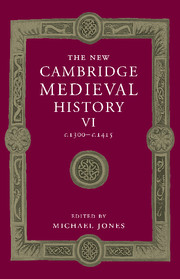Book contents
- Frontmatter
- Part I General Themes
- Part II The States of the West
- 13 The British Isles
- (a) England: Edward II and Edward III
- (b) The Reign of Richard II
- (c) Wales
- (d) Fourteenth-Century Scotland
- (e) Ireland
- 14 France
- 15 Italy in the age of Dante and Petrarch
- 16 The empire
- 17 The Low Countries, 1290–1415
- 18 The Iberian Peninsula
- Part III The Church and Politics
- Part IV Northern and Eastern Europe
- Appendix Genealogical Tables
- Primary Sources and Secondary Works Arranged by Chapter
- Index
- Frontispiece
- Plate section
- Map 4 Europe's trade, c. 1300
- Map 5 Europe's trade, c. 1400
- Map 7 The Hundred Years War to 1360
- Map 15 Russia, c. 1396
- Map 17 The Byzantine empire in the 1340s
- References
(e) - Ireland
from 13 - The British Isles
Published online by Cambridge University Press: 28 March 2008
- Frontmatter
- Part I General Themes
- Part II The States of the West
- 13 The British Isles
- (a) England: Edward II and Edward III
- (b) The Reign of Richard II
- (c) Wales
- (d) Fourteenth-Century Scotland
- (e) Ireland
- 14 France
- 15 Italy in the age of Dante and Petrarch
- 16 The empire
- 17 The Low Countries, 1290–1415
- 18 The Iberian Peninsula
- Part III The Church and Politics
- Part IV Northern and Eastern Europe
- Appendix Genealogical Tables
- Primary Sources and Secondary Works Arranged by Chapter
- Index
- Frontispiece
- Plate section
- Map 4 Europe's trade, c. 1300
- Map 5 Europe's trade, c. 1400
- Map 7 The Hundred Years War to 1360
- Map 15 Russia, c. 1396
- Map 17 The Byzantine empire in the 1340s
- References
Summary
when in 1394 Richard II led an army to Ireland, he was the first ruler of England to visit the lordship since John in 1210. Richard’s expedition did, however, have recent precedents, most notably that of his uncle, Lionel, earl of Ulster and duke of Clarence, who had been Edward III’s lieutenant there from 1361 to 1366. In a great council held at Kilkenny in 1360 the English of Ireland had told Edward of the perilous state of the country, portraying themselves as assailed on all sides by the Irish, and the justiciar as hampered by shrinking revenues and faced by attacks on so many marches that he could no longer cope. The despatch of Lionel with a large retinue paid mostly from English sources was in part an answer to this plea for assistance. Likewise in 1385, the prelates, lords and commons of Ireland had predicted an imminent conquest of the land and had asked Richard II to ‘prepare in his own person to survey and visit his said lordship for its rescue and salvation’. A not dissimilar message was sent by the citizens of Dublin in 1392.
Such appeals, and the English responses to them, would have amazed Edward I, who had taken his authority in Ireland largely for granted. In his day the Dublin government had been financially self-sufficient; it had regularly sent cash to England, raised supplies for the Welsh and Scottish wars and recruited expeditionary forces for royal campaigns in Flanders and Scotland.
- Type
- Chapter
- Information
- The New Cambridge Medieval History , pp. 375 - 387Publisher: Cambridge University PressPrint publication year: 2000
References
- 25
- Cited by

